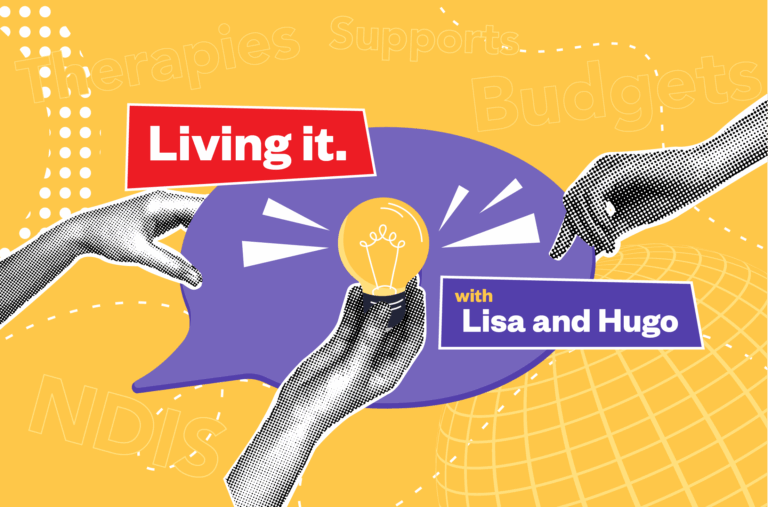Parents, family members, teachers and members of the community often play an important role in supporting people with disability.
The NDIS recognises the role these ‘informal supports’ play and how they complement formal, paid supports.
But what exactly are informal supports and why are they important when it comes to the NDIS? Read on to find out.
What are informal supports?
Informal supports refer to the help you receive from people you know. They’re considered ‘informal’ because you don’t pay the person and there’s no formal agreement or arrangement in place, such as a service agreement.
These supports are often the everyday things that friends and family do for us, and with us, because they care.
Examples of informal supports include:
- The help you get at home from family members, such as with personal care
- Help from your brother or sister to set up a new device or software
- A friend giving you a lift to appointments, school, uni or work
- Support from a community group member to learn new skills.
Top tip: The NDIS doesn’t replace informal supports. It aims to complement them and help ensure they can continue.
What’s the difference between informal and formal support networks?
Informal supports come from your personal network, like family, friends and neighbours. You don’t pay for these supports and there’s no formal agreement between you.
Formal supports are paid services delivered by providers. These might include allied health professionals, support workers or specialist services funded through your NDIS Plan.
Understanding both types is important when preparing for your NDIS Plan meeting, as the NDIS considers the whole picture of your support needs.
Recording informal supports.
Providing accurate information about the types of informal supports you receive is an important part of getting ready to access the NDIS, preparing for your first NDIS Plan meeting and any plan reassessments.
The NDIS considers your current informal and mainstream supports, as well as any recent changes.
Tips for recording informal supports:
- Be honest about the supports you receive
- Include the name of the person, their relationship to you, the type of help they provide and how often you receive it
- Include both daily supports and occasional ones, such as once or twice a month.
Record your crew and how they help you with the Leap in! app.
The Leap in! app is the perfect place to keep track of your informal supports. It lets you easily add people that are important in your life and you can even upload a photo. Choose to give them access and decide what information they can see to help you reach your goals.
Download on the App Store, get it on Google Play or try the web app.
Maintaining good relationships with your informal supports.
The relationships you have with your family, friends and community are important, and sometimes complex. Open and honest communication with your informal supporters builds trust and helps you get the support you need in a way that works for everyone.
If a family member is providing regular or intensive support, it’s a good idea to raise this at your NDIS Plan meeting. You may be able to include funding for respite or other supports that help sustain these informal relationships.
The NDIS can also fund training or resources for your informal supporters, such as helping a parent learn to use an assistive device with you.
Informal supports for children.
The NDIS recognises that it’s usual for parents and close family to provide most of the care and support that young children need. For example, it’s reasonable to expect parents or family members to:
- Drive a child to after-school activities
- Provide personal care such as assisting to bathe and dress
- Supervise at swimming lessons or community events
- Provide food, emotional support, decision-making and a safe home.
The NDIS will not generally fund family members to provide these supports.
However, the NDIS may fund additional supports for children if:
- The child’s needs are substantially greater or more complex than those of other children the same age due to disability
- There are risks to the wellbeing of parents or carers
- The support helps build the child’s skills and capacity.
As children grow older, it’s reasonable to expect they’ll become more independent and that the role of parents will change.
Informal supports for adults.
For adults, informal supports might include things like:
- A friend taking you to the football
- Emotional support from a family member
- Help from a neighbour with errands.
When considering whether to fund a support, the NDIS looks at whether it’s reasonable to expect someone in your personal network to provide that support.
They also consider:
- How informal supports work together with other supports in your NDIS plan
- Whether your informal supporters are ageing, unwell or unable to continue helping
- If the support is essential for your safety or independence
- If there are risks to you or the wellbeing of informal carers.
If a support is no longer safe or sustainable, the NDIS may fund it through your plan.
Can you pay family members to provide supports?
The NDIS generally does not fund family members to provide supports, except in exceptional circumstances.
Funding may be considered only if:
- There is a risk of harm or neglect
- There are religious or cultural reasons
- The person has strong personal views, such as around privacy or dignity.
The NDIS considers each case individually, taking into account your wishes, the type of support needed and what’s reasonable to expect others to provide.
Important: Personal care and community access supports from family members are unlikely to be funded unless all other options have been exhausted.
For people with Agency-managed plans, the family member must be a registered NDIS provider and the support must be formally approved in your plan.
What to do if your informal supports change.
If your informal supports change, such as someone moving away, getting a new job, or no longer being able to help, it’s important to let the NDIS know. This helps ensure your plan continues to meet your needs.
You can:
- Fill out a Change of Details or Change of Situation form
- Contact the NDIS by phone
- Visit your local NDIA office.
Leap in! can help.
Leap in! has more helpful resources on recording your informal supports. Take a look at our story, Preparing for your NDIS Plan meeting: The people who support you for examples and practical tips.
Need help managing your NDIS Plan? Reach out to the Leap in! Crew via phone, email or chat on our website.
Originally published 12 March 2021, updated 23 October 2024, reviewed 22 July 2025.


